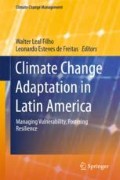Abstract
Ecosystem integrity (EI) may be defined as an equilibrium state of a given natural system able to self-regulate throughout many functional processes. The concept of biodiversity is quite diverse, and it is related to different levels of biological systems ranging from the level of genes, species taxonomic richness to functional groups. In this way, depending on the approach, several indicators, conceptually unrelated, can be used to characterize and quantify the biodiversity of a given natural system. However, in practical terms, the biodiversity, as a characteristic of ecosystems, is an indicator of the ecosystem´s stage regarding its pristine conditions. Then, Ecosystem Integrity has emerged as an important indicator to assess the relationship between biodiversity loss and the impacts on ecosystem services in tropical forests, once EI represents a connection between biodiversity and the ability of ecosystems to maintain the self-organization process. The objective of this chapter is to present a methodological approach developed for generating an Ecosystem Integrity index at regional scale, for different phyto-physiognomies patterns of landscapes, using a probabilistic model based on Bayesian Belief Networks (BBN), and totally free web-available satellite products. The methodology was applied to Brazil’s Legal Amazon region. The results show that it is possible to quantify areas of the Amazon rainforest with high or low Ecosystem Integrity. Using the same Bayesian network, with updated satellite data, it becomes possible to monitor the EI over time, and may even serve to establish a monitoring protocol and planning of mitigation/adaptation procedures.
Access this chapter
Tax calculation will be finalised at checkout
Purchases are for personal use only
References
BRASIL (2012) Plano setorial de mitigação e de adaptação às mudanças climáticas para a consolidação de uma economia de baixa emissão de carbono na agricultura (Plano ABC)/Ministério da Agricultura, Pecuária e Abastecimento, Ministério do Desenvolvimento Agrário, Coordenação da Casa Civil da Presidência da República.—Brasília: MAPA/ACS, 2012. http://www.agricultura.gov.br/arq_editor/download.pdf. Accessed 23 April 2015
Convention on Biological Diversity (CBD) (1992) Text of the CBD—Article 2, use of terms. http://www.cbd.int/convention/text/. Accessed 10 Aug 2015
De Groot R (2005) Function-analysis and valuation as a tool to assess land use conflicts in planning for sustainable, multi-functional landscapes. Landsc Urban Plan 75:175–186
Do CB, Batzoglou S (2008) What is the expectation maximization algorithm? Nat Biotechnol 26(8):897
Equihua M, Maeda PD, Equihua J, Alaniz NG, Kolb M, Schmidt M (2013) ROBIN—role of biodiversity. In: climate change mitigation. 1st report 15th of March 2013
FAO (2006) Global forest resources assessment 2005. FAO forestry paper no. 147 UN Food and Agriculture Organization, Rome. http://www.fao.org/docrep/008/a0400e/a0400e00.htm. Accessed 11 Sep 2016
Gret-Regamy A, Brunner S, Altwegg J, Bebi P (2013) Facing uncertainty in ecosystem services-based resource management. J Environ Manage 127:145–154
Haines-Young R (2011) Exploring ecosystem service issues across diverse knowledge domains using Bayesian Belief Networks. Prog Phys Geog 35(5):681–699
Holdridge LR (1977) Life zone ecology. In: II CA. Tropical science center, San José, Costa Rica. Anais, p 118
Intergovernmental Panel on Climate Change (IPCC) (2007) Climate change 2007. Cambridge University Press, Cambridge. v. I: The physical science basis; v. II: Impacts, adaptation and vulnerability; v. III: Mitigation of climate change. https://www.ipcc.ch/publications_and_data/publications_and_data_reports.shtml. Accessed 05 May 2014
Jorgensen S, Müller F (2000) Handbook of ecosystem theories and management. CRC Press, Boca Raton
Krug T (2008) Mudanças climáticas e o Brasil—Contextualização. Parcerias Estratégicas 27:43–49
Lauria EJM, Duchessi PJ (2006) A methodology for developing Bayesian networks: an application to information technology (IT) implementation. Eur J Oper Res 179:234–252
Lindley DV (1972) Bayesian statistics, a review. SIAM, Philadelphia [A sharp comprehensive review of the whole subject up to the 1970’s emphasizes its internal consistency]
Nobre CA (2008) Mudanças climáticas e o Brasil—Contextualização. Parcerias Estratégicas 27:7–17
Simões M, Ferraz RPD, Verweij P, Equihual M, Maqueo O, Alves AO (2014) Modelo Bayesiano de dados espaciais aplicado ao mapeamento da integridade ecossistêmica da Amazônia brasileira. In: Environnement et géomatique: approches comparées France -Brésil. Anais. Universidade de São Paulo/Université Rennes, São Paulo
Stelzenmuller V, Lee J, Garnacho E, Rogers S (2010) Assessment of a Bayesian belief network-GIS framework as a practical tool to support marine planning. Mar Pollut Bull 60:1743–1754
Verweij P, Simões M, Alves AO, Ferraz RPD, Cormont A (2014) Linking Bayesian belief networks and GIS to assess the ecosystem integrity in the Brazilian Amazon. In: Ames DP, Quinn NWT, Rizzoli AE (eds) 7th international congress on environmental modelling and software, International Environmental Modelling Society (iEMSs), San Diego, CA, USA
Acknowledgements
This work is part of ROBIN Project—“Role of Biodiversity in Climate Change Mitigation” sponsored by the European Union (FP7 Edict ENV. 2011.2.1.4-1: Potential of biodiversity and ecosystems for the mitigation of climate change) and ODYSSEA Project “Observatory of the dynamics of interactions between societies and environment in the Amazon” financed by European Commission, Horizon 2020.
Author information
Authors and Affiliations
Corresponding author
Editor information
Editors and Affiliations
Rights and permissions
Copyright information
© 2018 Springer International Publishing AG
About this chapter
Cite this chapter
Simões, M., Ferraz, R.P.D., Alves, A.O. (2018). Assessing Ecosystem Integrity in the Brazilian Amazon Rainforest to Indicate Biodiversity Loss and Highlight Areas for Adaptation Policies. In: Leal Filho, W., Esteves de Freitas, L. (eds) Climate Change Adaptation in Latin America. Climate Change Management. Springer, Cham. https://doi.org/10.1007/978-3-319-56946-8_21
Download citation
DOI: https://doi.org/10.1007/978-3-319-56946-8_21
Published:
Publisher Name: Springer, Cham
Print ISBN: 978-3-319-56945-1
Online ISBN: 978-3-319-56946-8
eBook Packages: Earth and Environmental ScienceEarth and Environmental Science (R0)

